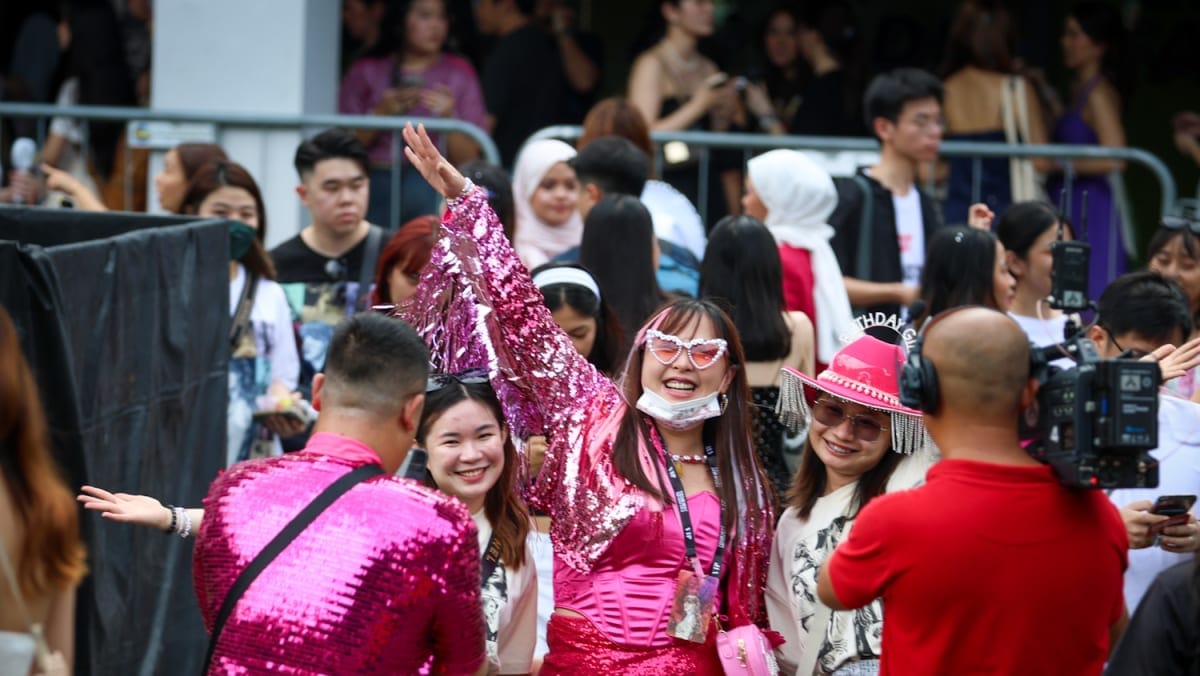Singapore's economy boosted by Taylor Swift, Coldplay shows; over half of concertgoers 'likely' from overseas

Source: TODAY
SINGAPORE -- Singapore's economy was boosted by a "surge in tourism activity" in the first quarter of 2024 due to concerts by British rock band Coldplay and American pop star Taylor Swift, the Monetary Authority of Singapore (MAS) said on Friday (April 26).
Both acts played at the 55,000-capacity National Stadium -- Singapore's largest stadium -- with Coldplay's concerts taking place in January and Swift's shows happening in March.
"These concerts took place over 12 days in total, with more than half the audience likely coming from abroad," MAS said in its latest macroeconomic review, which is released twice a year.
Coldplay sold more than 200,000 tickets to their initial four shows in Singapore, while more than 300,000 tickets to Swift's concerts were snapped up.
According to statistics from the Singapore Tourism Board (STB), there were 4,353,500 international visitor arrivals in the first three months of the year. That is a 50 per cent increase from the same period last year and a 26 per cent increase from the last quarter of 2023.
Singapore's economy grew 2.7 per cent in the first quarter of the year from the same period a year ago. In the last quarter of 2023, the economy grew 2.2 per cent.
The growth in the first quarter was despite a pullback in manufacturing activity, with the biomedicals and electronics clusters posting weak growth.
Activity in the modern services cluster was also dampened, primarily because of the finance and insurance sector, MAS said.
The large-scale concerts could have generated tourism receipts of between S$350 million to S$450 million, according to estimates by private-sector analysts, MAS noted.
The estimates differed based on assumptions such as the attendees' length of stay in Singapore.
"This represents a 6 per cent injection above the average quarterly tourism receipts recorded in Q1 to Q3 last year," the report said. That would have provided a boost to sectors such as air transport, accommodation, arts, retail and more.
MAS pointed out hotel occupancies rose to 80 per cent in the first two months of the year, compared with 77 per cent in the previous quarter.
CNA reported in February that demand for flights and accommodation increased by up to 30 per cent around Swift's concert dates.
Singapore was the only stop in Southeast Asia for Swift's Eras Tour. The exclusive arrangement was negotiated by local agencies and caused a regional stir.
Representative Joey Salceda, a lawmaker in the Philippines, reportedly said "this isn't what good neighbours do", in reference to Singapore's actions.
The deal was first thrown into the spotlight when Thai Prime Minister Srettha Thavisin told media that Singapore paid the American singer-songwriter up to US$3 million for each of her concerts in order to keep the shows exclusive to Singapore.
However, Singapore's Minister for Culture, Community and Youth Edwin Tong later clarified that the amount paid was "nowhere as high" as reports suggest. CNA understands that the figure is closer to US$2 million to US$3 million for all six shows.
The impact of the concerts is likely temporary in nature, and tourism-related activity should normalise after the "concert-induced windfall", MAS said.
For the rest of the year, Singapore's economic growth will be driven by the global macroeconomic, tech and interest rate cycles.
Singapore's gross domestic product is expected to come in at 1 per cent to 3 per cent for the year.
The global economy is displaying more resilience than expected, and trade-related sectors should be supported by the upturn in the electronics and tech cycle.
The global semiconductor industry is on the cusp of an "expansion" phase, MAS said, which is characterised by positive chip sales growth and a fall in chip inventory.
Meanwhile, the financial sector should continue recovering when central banks start to cut interest rates, which is expected to happen in the second half of the year.
Other concerts and the return of Chinese tourists will contribute to firm growth in inbound tourism. Travel-related and domestic oriented clusters will moderate but stay above trend, said MAS.
The central bank also said that core inflation -- which excludes the costs of accommodation and private transport -- is expected to decline gradually over the year, before stepping down "more discernibly" in the last quarter of the year and into next year.
Both core inflation and headline inflation are projected to average 2.5 per cent to 3.5 per cent for 2024. CNA
